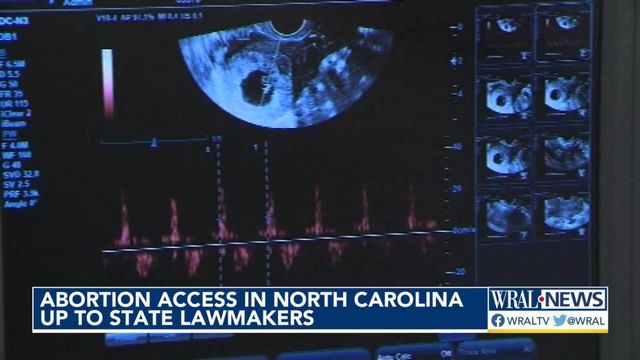NC abortion ruling a 'gauntlet' to advocacy groups for midterms
Wednesday's ruling reinstating North Carolina's 20-week abortion ban increased the importance of the upcoming elections. With abortion access now up to state lawmakers, both sides see North Carolina as a high-stakes battleground.
Posted — UpdatedBoth sides in the abortion debate had expected U.S. District Judge William Osteen to revisit an injunction preventing enforcement of the ban after the U.S. Supreme Court overturned Roe v. Wade, leaving it up to states to set their own abortion laws.
Osteen's ruling Wednesday has officially given state lawmakers free rein to impose any new abortion restrictions they want to. At a news conference Wednesday for abortion rights advocates, Sen. Natalie Murdock, D-Durham, said Republican legislative leaders have already promised to do just that.
“They are just getting started," Murdock said. "The 20-week ban will just be the start. It could be a complete ban. It could be a six-week ban. We don't know.”
The current law bans abortion with exceptions for urgent medical emergencies after 20 weeks of pregnancy.
Neither House nor Senate leaders have given details about what, if anything, they’re likely to propose. House Speaker Tim Moore, R-Cleveland, has said he personally favors a “heartbeat bill,” which would be a six-week ban. Senate Leader Phil Berger, R-Rockingham, has said he would support some early abortion access with restrictions later, but didn’t specify a number of weeks.
The only thing standing the way of additional restrictions is Gov. Roy Cooper. The second-term Democrat has vetoed every abortion restriction bill GOP lawmakers have sent him for the past four years. But his veto power hangs by a very slender thread this fall. Republicans need to win just three more seats in the state House and two in the state Senate to regain their supermajority, and with it the power to override his veto.
The GOP is also hoping to win a majority on the state Supreme Court, where two of seven seats are on the ballot this year. The current balance of power on the high court is four Democrats and three Republicans.
Catawba College political science professor Michael Bitzer says both are within reach for the GOP.
“If they are able to have supermajorities in the legislature and control of the state's highest court, they basically could write whatever kind of abortion policy they want, and exclude the Democrats, particularly the governor with any veto threat,” Bitzer told WRAL News. “The question becomes: 'How much further in terms of restrictions would Republicans be willing to push the envelope?'”
Abortion opponents in North Carolina are pinning their hopes on this fall’s election. Tami Fitzgerald is state chairperson for Susan B. Anthony Pro-Life America.
“It's important for people in North Carolina who are pro-life, who believe that unborn babies are humans and they deserve rights, to get out and vote this fall,” Fitzgerald said of Osteen’s ruling. “The way the way forward is for pro-life people in North Carolina to elect representatives in the General Assembly and on the Supreme Court who share their values.”
Fitzgerald said the national group has been active on the ground in North Carolina for years, and has pledged to spend $18 million this campaign cycle to help boost anti-abortion candidates across the country.
“They've now knocked on almost 500,000 doors, advocating at the door for pro-life candidates in North Carolina,” she said. “We work very hard in election season because we realize that the people who sit in the seats in the General Assembly are critically important to advancing the issue of life.”
Abortion rights advocates are also planning their own mobilization. The political arm of Planned Parenthood announced this week it will invest $50 million — its largest expenditure — in nine states this election cycle. North Carolina is one of those states. Director Alison Kiser says they’ll work to defend Democratic seats in the legislature and on the state's high court.
Kiser says they’ll be talking to voters about what’s at stake in this election, especially for women, minority and lower-income voters.
“These are the people who are really going to feel the harmful impacts of abortion bans and understand more clearly now than ever before that abortion access and their reproductive freedoms really are on the ballot this year,” Kiser said.
Kiser said the Supreme Court ruling overturning Roe has energized voters who might not previously have considered abortion on of their top voting issues. She said they’ve been inundated with calls offering donations and volunteer help.
“I am definitely hearing from folks that it is a wake-up call and sensing a great deal of momentum,” she said. “Just the fact that abortion care hangs in the balance for so many hundreds of thousands of people, but that it could all fall just in the course of one election, is certainly very unusual."
“It throws another gauntlet down for both sides to acknowledge that this is going to be an issue come November,” Bitzer said. “I could see a very easy new record set in North Carolina midterm elections for turnout on that alone.”
• Credits
Copyright 2024 by Capitol Broadcasting Company. All rights reserved. This material may not be published, broadcast, rewritten or redistributed.






